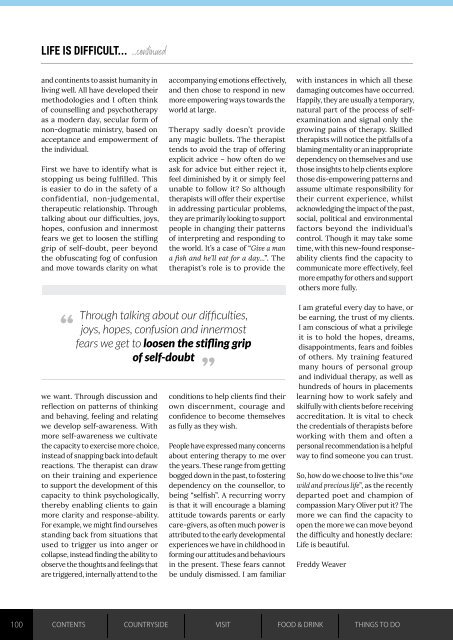Devonshire ezine Spring 19
Create successful ePaper yourself
Turn your PDF publications into a flip-book with our unique Google optimized e-Paper software.
LIFE IS DIFFICULT... ...continued<br />
and continents to assist humanity in<br />
living well. All have developed their<br />
methodologies and I often think<br />
of counselling and psychotherapy<br />
as a modern day, secular form of<br />
non-dogmatic ministry, based on<br />
acceptance and empowerment of<br />
the individual.<br />
First we have to identify what is<br />
stopping us being fulfilled. This<br />
is easier to do in the safety of a<br />
confidential, non-judgemental,<br />
therapeutic relationship. Through<br />
talking about our difficulties, joys,<br />
hopes, confusion and innermost<br />
fears we get to loosen the stifling<br />
grip of self-doubt, peer beyond<br />
the obfuscating fog of confusion<br />
and move towards clarity on what<br />
accompanying emotions effectively,<br />
and then chose to respond in new<br />
more empowering ways towards the<br />
world at large.<br />
Therapy sadly doesn’t provide<br />
any magic bullets. The therapist<br />
tends to avoid the trap of offering<br />
explicit advice – how often do we<br />
ask for advice but either reject it,<br />
feel diminished by it or simply feel<br />
unable to follow it? So although<br />
therapists will offer their expertise<br />
in addressing particular problems,<br />
they are primarily looking to support<br />
people in changing their patterns<br />
of interpreting and responding to<br />
the world. It’s a case of “Give a man<br />
a fish and he’ll eat for a day…”. The<br />
therapist’s role is to provide the<br />
with instances in which all these<br />
damaging outcomes have occurred.<br />
Happily, they are usually a temporary,<br />
natural part of the process of selfexamination<br />
and signal only the<br />
growing pains of therapy. Skilled<br />
therapists will notice the pitfalls of a<br />
blaming mentality or an inappropriate<br />
dependency on themselves and use<br />
those insights to help clients explore<br />
those dis-empowering patterns and<br />
assume ultimate responsibility for<br />
their current experience, whilst<br />
acknowledging the impact of the past,<br />
social, political and environmental<br />
factors beyond the individual’s<br />
control. Though it may take some<br />
time, with this new-found responseability<br />
clients find the capacity to<br />
communicate more effectively, feel<br />
more empathy for others and support<br />
others more fully.<br />
Through talking about our difficulties,<br />
joys, hopes, confusion and innermost<br />
fears we get to loosen the stifling grip<br />
of self-doubt<br />
we want. Through discussion and<br />
reflection on patterns of thinking<br />
and behaving, feeling and relating<br />
we develop self-awareness. With<br />
more self-awareness we cultivate<br />
the capacity to exercise more choice,<br />
instead of snapping back into default<br />
reactions. The therapist can draw<br />
on their training and experience<br />
to support the development of this<br />
capacity to think psychologically,<br />
thereby enabling clients to gain<br />
more clarity and response-ability.<br />
For example, we might find ourselves<br />
standing back from situations that<br />
used to trigger us into anger or<br />
collapse, instead finding the ability to<br />
observe the thoughts and feelings that<br />
are triggered, internally attend to the<br />
conditions to help clients find their<br />
own discernment, courage and<br />
confidence to become themselves<br />
as fully as they wish.<br />
People have expressed many concerns<br />
about entering therapy to me over<br />
the years. These range from getting<br />
bogged down in the past, to fostering<br />
dependency on the counsellor, to<br />
being “selfish”. A recurring worry<br />
is that it will encourage a blaming<br />
attitude towards parents or early<br />
care-givers, as often much power is<br />
attributed to the early developmental<br />
experiences we have in childhood in<br />
forming our attitudes and behaviours<br />
in the present. These fears cannot<br />
be unduly dismissed. I am familiar<br />
I am grateful every day to have, or<br />
be earning, the trust of my clients.<br />
I am conscious of what a privilege<br />
it is to hold the hopes, dreams,<br />
disappointments, fears and foibles<br />
of others. My training featured<br />
many hours of personal group<br />
and individual therapy, as well as<br />
hundreds of hours in placements<br />
learning how to work safely and<br />
skilfully with clients before receiving<br />
accreditation. It is vital to check<br />
the credentials of therapists before<br />
working with them and often a<br />
personal recommendation is a helpful<br />
way to find someone you can trust.<br />
So, how do we choose to live this “one<br />
wild and precious life”, as the recently<br />
departed poet and champion of<br />
compassion Mary Oliver put it? The<br />
more we can find the capacity to<br />
open the more we can move beyond<br />
the difficulty and honestly declare:<br />
Life is beautiful.<br />
Freddy Weaver<br />
100 CONTENTS COUNTRYSIDE VISIT<br />
FOOD & DRINK THINGS TO DO

















